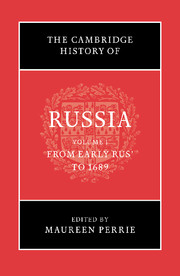Book contents
- Frontmatter
- 1 Introduction
- 2 Russia’s geographical environment
- Part I Early Rus’ and the Rise of Muscovy (c. 900–1462)
- Part II The Expansion, Consolidation and Crisis of Muscovy (1462–1613)
- 9 The Growth of Muscovy (1462–1533)
- 10 Ivan IV (1533–1584)
- 11 Fedor Ivanovich and Boris Godunov (1584–1605)
- 12 The Peasantry
- 13 Towns and commerce
- 14 The non-Christian peoples on the Muscovite frontiers
- 15 The Orthodox Church
- 16 The law
- 17 Political ideas and rituals
- 18 The Time of Troubles (1603–1613)
- Part III Russia Under the First Romanovs (1613–1689)
- Bibliography
- Index
- Plate section"
- Plate section"
- References
11 - Fedor Ivanovich and Boris Godunov (1584–1605)
from Part II - The Expansion, Consolidation and Crisis of Muscovy (1462–1613)
Published online by Cambridge University Press: 28 March 2008
- Frontmatter
- 1 Introduction
- 2 Russia’s geographical environment
- Part I Early Rus’ and the Rise of Muscovy (c. 900–1462)
- Part II The Expansion, Consolidation and Crisis of Muscovy (1462–1613)
- 9 The Growth of Muscovy (1462–1533)
- 10 Ivan IV (1533–1584)
- 11 Fedor Ivanovich and Boris Godunov (1584–1605)
- 12 The Peasantry
- 13 Towns and commerce
- 14 The non-Christian peoples on the Muscovite frontiers
- 15 The Orthodox Church
- 16 The law
- 17 Political ideas and rituals
- 18 The Time of Troubles (1603–1613)
- Part III Russia Under the First Romanovs (1613–1689)
- Bibliography
- Index
- Plate section"
- Plate section"
- References
Summary
At the end of Ivan the Terrible’s reign Russia experienced an acute political, social and economic crisis. The protracted Livonian war and natural disasters had brought the economic life of the country to a complete collapse. The Novgorod tax cadastres depict a catastrophic decline in the population by the beginning of the 1580s (by almost 80 per cent) and the neglect of arable land (the proportion of untilled land was more than 90 per cent). The crisis affected not only the north-west but the entire territory of Russia. The economic decline had a deleterious effect on the military capability of the army – many noblemen were unable to provide service from their devastated estates. After Groznyi’s death the Polish King Stefan Batory nurtured plans to invade Russia. He counted on finding support in some circles of Russian society. When M. I. Golovin defected to Lithuania he assured the king that he would not encounter any serious resistance in Russia. The country faced a real threat of foreign invasion and internal unrest.
The situation was compounded by a profound crisis in the ruling elites. A power struggle began immediately after the death of Tsar Ivan. On the very night of his death (the night of 18/19 March 1584) conflicts occurred in the duma, as a result of which Tsarevich Dmitrii’s kinsmen, the Nagois, were arrested and banished from court. Shortly afterwards Tsarevich Dmitrii was dispatched to his apanage at Uglich. Groznyi’s elder son Fedorwas elevated to the throne. A sickly and weak-willed individual, he was not capable of ruling independently and, according to contemporaries, he found the performance even of formal court ceremonies to be a burden.
Keywords
- Type
- Chapter
- Information
- The Cambridge History of Russia , pp. 264 - 285Publisher: Cambridge University PressPrint publication year: 2006
References
- 1
- Cited by



